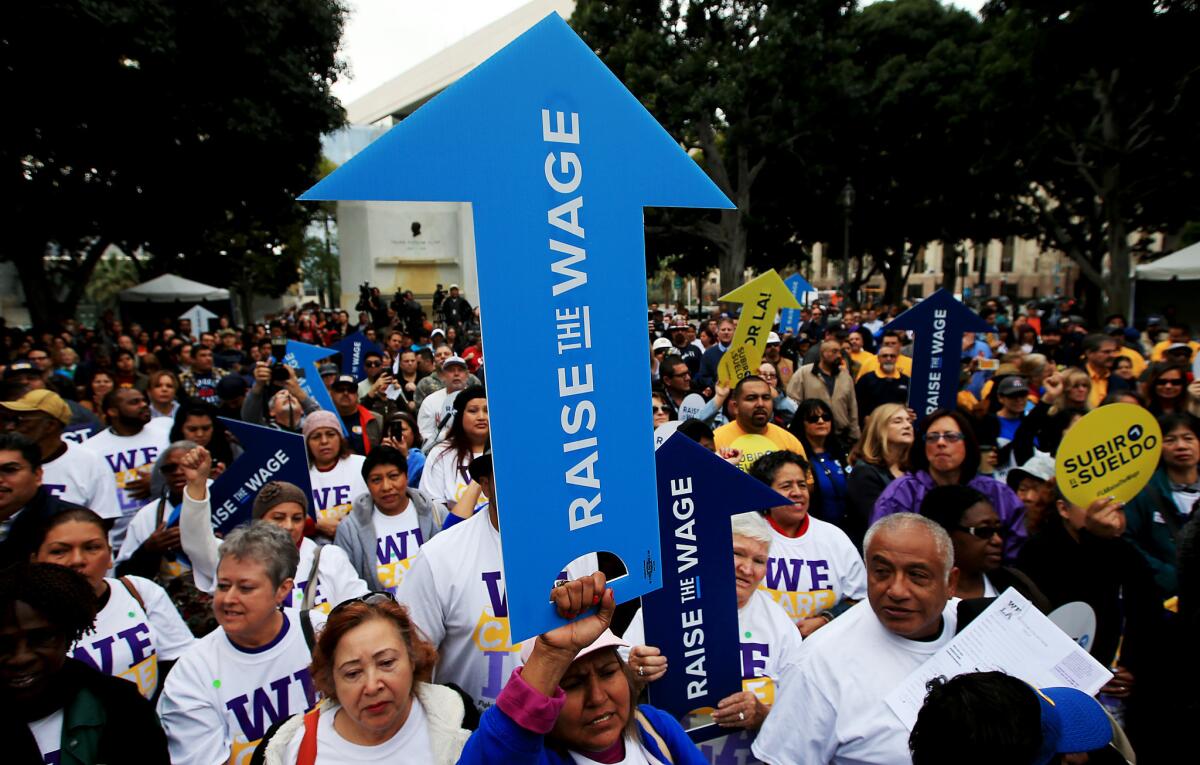Would L.A. wage hike cost 140,000 jobs or add $5.9 billion in stimulus?

- Share via
Business and labor groups released warring studies Thursday on how boosting the citywide minimum wage to $13.25 or $15.25 an hour would affect the Los Angeles economy.
The new analyses mark the latest step in the pitched debate over how or whether the city should follow in the footsteps of Seattle and San Francisco, where city leaders have hiked pay as part of a national push to reduce poverty and economic inequality.
Last year, Mayor Eric Garcetti proposed a step-by-step increase in the minimum wage to reach $13.25 by 2017, with future increases automatically tied to an inflation index. Several city lawmakers want to go further, boosting the base wage to $15.25 by 2019. The current statewide minimum wage is $9 per hour.
Garcetti and other city leaders argue that a wage hike is needed to pull working Angelenos out of poverty and jump-start the local economy. But key business organizations and other critics have challenged whether a wage hike would end up hurting the workers it is meant to help.
The Los Angeles Area Chamber of Commerce issued a report warning that raising the base wage to $13.25 citywide would sharply reduce and possibly even eliminate job growth as businesses relocate outside the city or employ fewer people.
Prepared by Beacon Economics, the report estimated that the new $13.25 base would result in 73,000 to 140,000 fewer new jobs over the next five years. Job losses would hit young and less educated workers hardest, the report said.
It also warned that the bulk of the increased wages would not help Los Angeles residents in poor households, because many workers with low wages live outside of the city, or in households where total income exceeds $55,000.
And it added that some industries could face steep increases in labor costs -- as high as 14% of revenues for restaurants and bars, for example. Such economic blows could hurt city revenues, undermining its ability to support programs for Angelenos in need, the report said.
All in all, raising the minimum wage to $13.25 would have “significant negative effects” on the Los Angeles economy with “at best, modest benefits” for residents with low incomes, the report said.
Beacon Economics did not analyze the effects of a $15.25 hourly wage. “If $13.25 is bad … raising it to $15.25 is a kind of nightmare,” its founding partner, Chris Thornberg, said.
Instead, its report recommended a smaller and slower hike in wages, finding a legal way of eliminating or reducing the boost for workers who get tips, and excluding nonprofits and small businesses from the requirement, among other steps to soften its effect.
“This truly independent study makes clear that the current minimum wage proposals will limit the growth to our economy, limit the growth of jobs, limit funding to city services and not actually reach those it intends to help,” chamber senior vice president Ruben Gonzalez said in a statement. “It is well intended public policy, but damaging in reality.”
But another study released Thursday, underwritten by the Los Angeles County Federation of Labor, reached a different conclusion: Raising the minimum wage to $15.25 hourly -- a higher threshold than the chamber report examined -- would create an additional 46,400 new jobs across the region by 2019 compared with today, including nearly 25,000 in Los Angeles.
The boost would produce $5.9 billion in added wages in that year, including nearly $3.2 billion for workers living in L.A., causing “a stimulus effect for the region,” the report from the nonprofit Economic Roundtable concluded.
Hiking pay would also pump up state and local tax revenue by $414 million, federal revenue by $546 million, and reduce spending on public assistance by $314 million annually across the region, according to the report.
The Economic Roundtable report said job losses would be minimal, pointing to other, earlier studies of pay boosts in Los Angeles and elsewhere. Most Los Angeles jobs paying low wages involve “face-to-face work that requires a physical presence in Los Angeles,” in industries such as education, healthcare or restaurants, it said.
The report also assessed how wage increases would affect different parts of the city. It concluded that areas with weak markets and scarce jobs would benefit from increased demand for consumer goods.
On the flip side, many of the possible costs to businesses and consumers from hiking wages would happen in “areas relatively resilient to such adjustments,” including wealthier neighborhoods and those with “large, diverse concentrations of businesses,” the report said.
“There will be transformational possibilities with underinvested poor communities as workers in those communities have more money to spend,” said Daniel Flaming, president of the Economic Roundtable.
The report said the city should nonetheless monitor the economic effects of the increases as they are phased in, tracking business sales, employment and wages against other regions. It also stressed that L.A. must have tools to enforce the wage rules.
“This new research confirms what Angelenos already know and have been saying: They need $15.25 to raise their families and get ahead, and it needs to be enforced,” said Rusty Hicks, head of the labor federation, in a written statement.
A third report was also scheduled to be released Thursday -- this one from a UC Berkeley research team that was selected by city officials to analyze the wage proposals.
Los Angeles lawmakers are scheduled to hold a series of public forums in the coming weeks to discuss the studies and hear from community members about the proposed hikes.
Follow @latimesemily for what’s happening at Los Angeles City Hall.
More to Read
Sign up for Essential California
The most important California stories and recommendations in your inbox every morning.
You may occasionally receive promotional content from the Los Angeles Times.














